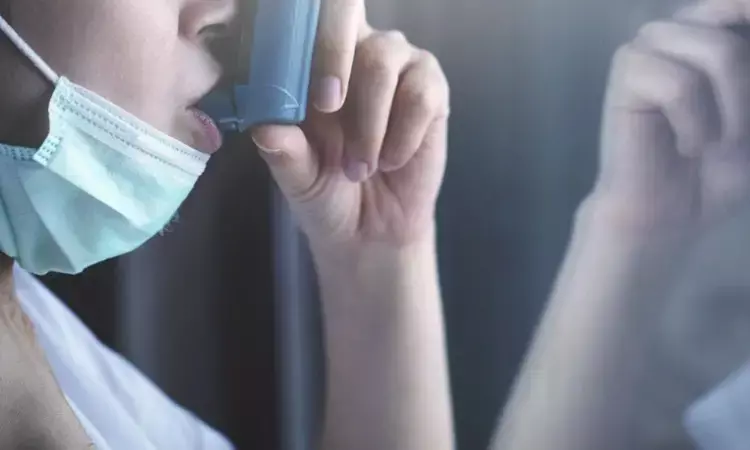- Home
- Medical news & Guidelines
- Anesthesiology
- Cardiology and CTVS
- Critical Care
- Dentistry
- Dermatology
- Diabetes and Endocrinology
- ENT
- Gastroenterology
- Medicine
- Nephrology
- Neurology
- Obstretics-Gynaecology
- Oncology
- Ophthalmology
- Orthopaedics
- Pediatrics-Neonatology
- Psychiatry
- Pulmonology
- Radiology
- Surgery
- Urology
- Laboratory Medicine
- Diet
- Nursing
- Paramedical
- Physiotherapy
- Health news
- Fact Check
- Bone Health Fact Check
- Brain Health Fact Check
- Cancer Related Fact Check
- Child Care Fact Check
- Dental and oral health fact check
- Diabetes and metabolic health fact check
- Diet and Nutrition Fact Check
- Eye and ENT Care Fact Check
- Fitness fact check
- Gut health fact check
- Heart health fact check
- Kidney health fact check
- Medical education fact check
- Men's health fact check
- Respiratory fact check
- Skin and hair care fact check
- Vaccine and Immunization fact check
- Women's health fact check
- AYUSH
- State News
- Andaman and Nicobar Islands
- Andhra Pradesh
- Arunachal Pradesh
- Assam
- Bihar
- Chandigarh
- Chattisgarh
- Dadra and Nagar Haveli
- Daman and Diu
- Delhi
- Goa
- Gujarat
- Haryana
- Himachal Pradesh
- Jammu & Kashmir
- Jharkhand
- Karnataka
- Kerala
- Ladakh
- Lakshadweep
- Madhya Pradesh
- Maharashtra
- Manipur
- Meghalaya
- Mizoram
- Nagaland
- Odisha
- Puducherry
- Punjab
- Rajasthan
- Sikkim
- Tamil Nadu
- Telangana
- Tripura
- Uttar Pradesh
- Uttrakhand
- West Bengal
- Medical Education
- Industry
Delayed Treatment with Inhaled Corticosteroids Affects Lung Function in Asthma, finds study

Researchers have found in a new study that patients with severe asthma beginning inhaled corticosteroid therapy (ICS) after decades delay exhibit different lung function trajectories. ICS is still considered the first-line treatment for asthma, but its long-standing effects on the lung function decline remain uncertain, especially after delayed initiation. This research was an examination of lung function decline, bearing in mind the predictors of FEV1 modifications and exacerbations in patients with previously untreated severe asthma. The study was conducted by Pca Almeida and colleagues which was published in the Journal of Asthma.
A ten-year-long observational study of 184 patients with asthma following regular inhaled corticosteroid (ICS) treatment was conducted. Most patients were female (84%) and over 50 years old. After a median of 30 years on regular ICS, they began. The lung function decline was assessed using two baseline options: (i) FEV1 after one year of regular treatment (V1) and (ii) the best FEV1 of any recorded previously before the final visit. This study aims to compare lung function outlines during the overall follow-up time with respect to the baseline and teeter and recognize predictors of further FEV1 decline and exacerbations.
Key Results
• FEV1 Decline: More than half of the subjects (54%) demonstrated an FEV1 decline of more than 25 ml/year on post-treatment lung function (V1).
• Predictors of Decline: Those with faster FEV1 decline were younger, had shorter asthma duration, and had better lung function at V1.
• Obstruction and Decline: Participants who did not manifest an obstructive pattern (74%) or mild obstruction (64%) at V1 showed more pronounced absolute FEV1 decline. However, those with preserved ratio-impaired spirometry (PRISm) were more appreciably impacted relative decline-wise.
• Exacerbations: Exacerbations within the first year of ICS treatment were strong predictors of future exacerbations and absolute lung function decline.
• Treatment Delay Impact: The longer period without ICS treatment was associated with relative FEV1 reduction and thus emphasizes the importance of early intervention.
The study authors concluded that long-time delay in ICS treatment results in marked decline in lung function of the patient of asthma. This underlines the vital need for early and continued use of ICS, thus preserving lung function as well as inhibiting exacerbation. Patients with treatment delays in history should further undergo regular monitoring for optimal disease management to help reduce long-term respiratory complications.
Reference:
Almeida P, Ponte E, Stelmach R, Harrison T, Scichilone N, Souza-Machado A, Cruz A. Exacerbation during the first year of treatment affects lung function in subjects with asthma - a 10-year follow-up. J Asthma. 2025 Feb 7:1-10. doi: 10.1080/02770903.2025.2451690. Epub ahead of print. PMID: 39888725.
Dr Riya Dave has completed dentistry from Gujarat University in 2022. She is a dentist and accomplished medical and scientific writer known for her commitment to bridging the gap between clinical expertise and accessible healthcare information. She has been actively involved in writing blogs related to health and wellness.
Dr Kamal Kant Kohli-MBBS, DTCD- a chest specialist with more than 30 years of practice and a flair for writing clinical articles, Dr Kamal Kant Kohli joined Medical Dialogues as a Chief Editor of Medical News. Besides writing articles, as an editor, he proofreads and verifies all the medical content published on Medical Dialogues including those coming from journals, studies,medical conferences,guidelines etc. Email: drkohli@medicaldialogues.in. Contact no. 011-43720751


